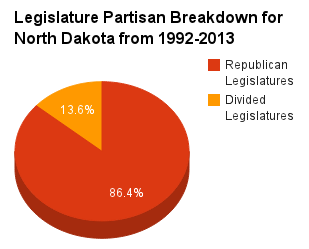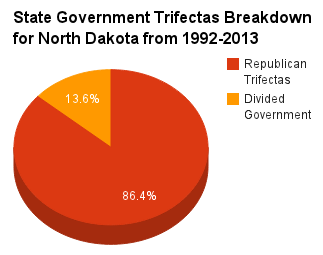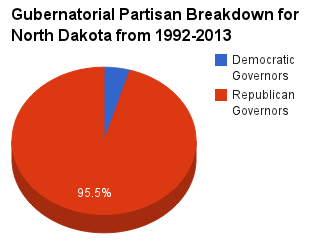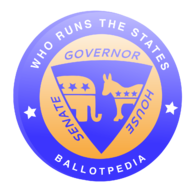Ballotpedia:Who Runs the States, North Dakota
Praise or blame is extended to political parties for the economic, educational, health and other quality of life outcomes that result from the policies those parties enact into law. To better understand which political party enjoys power in each of the states, Ballotpedia has analyzed state government control from 1992-2013 using the concept of a "partisan trifecta." A partisan trifecta is defined as when a state's governorship and legislative chambers are controlled by the same political party.
The two major political parties claim that their policies will lead to better outcomes. What does the data show?
At Ballotpedia, we explored these issues in a three-part study, Who Runs the States.
This page takes a specific look at how North Dakota performed in the study.
Background about the study
- See also: Ballotpedia: Who Runs the States
Part One examines the partisanship of state government from 1992 to 2013. Part Two establishes a State Quality of Life Index (SQLI), aggregating a variety of existing state indices into one measurement. Part Three will overlay the two reports, looking for trends and correlations.
Part 1: Partisanship analysis
North Dakota Governor
From 1992 to 2013, in North Dakota there were Democratic governors in office for the first year while there were Republican governors in office for the last 21 years. North Dakota is one of eight states that were run by a Republican governor for more than 80 percent of the years between 1992 and 2013. North Dakota has been under Republican trifectas for the last 19 years.
Across the country, there were 493 years of Democratic governors (44.82%) and 586 years of Republican governors (53.27%) from 1992-2013.
Over the course of the 22-year study, state governments became increasingly more partisan. At the outset of the study period (1992), 18 of the 49 states with partisan legislatures had single-party trifectas and 31 states had divided governments. In 2013, only 13 states have divided governments, while single-party trifectas held sway in 36 states, the most in the 22 years studied.
North Dakota Senate
From 1992 to 2013, the Democratic Party was the majority in the North Dakota State Senate for the first three years while the Republicans were the majority for the last 19 years. The North Dakota State Senate is one of 13 state senates that was Republican for more than 80 percent of the years between 1992 and 2013.
Across the country, there were 541 Democratic and 517 Republican state senates from 1992 to 2013.
North Dakota House of Representatives
During every year from 1992 to 2013, the Republican Party was the majority in the North Dakota State House of Representatives. The North Dakota House of Representatives is one of nine state Houses that was Republican for more than 80 percent of the years between 1992 and 2013.
Across the country, there were 577 Democratic and 483 Republican state houses of representatives from 1992 to 2013.
The chart below shows the partisan composition of the Office of the Governor of North Dakota, the North Dakota State Senate and the North Dakota House of Representatives from 1992-2013.
Partisan control changes
There were two partisan control changes in North Dakota during the study period. The average number of changes in the 50 states was four, putting North Dakota less than the average.
Part 2: State Quality of Life Index (SQLI)
North Dakota’s average ranking over the course of the study period was 20.14, which puts it at 21 in the overall SQLI ranking.[1]
- The year that North Dakota had the highest ranking was 2012, in which it ranked 3rd.
- The years that North Dakota had the lowest ranking were 1998 and 1999, in which it ranked 30th.
- The index type that North Dakota had the highest ranking in was Graduation Rate, in which it ranked 1st.
- The index type that North Dakota had the lowest ranking in was Government Employment Share of the Population, in which it ranked 48th.
| North Dakota SQLI 1992-2012 | ||||||||||||||||||||||||
|---|---|---|---|---|---|---|---|---|---|---|---|---|---|---|---|---|---|---|---|---|---|---|---|---|
| Index | 1992 | 1993 | 1994 | 1995 | 1996 | 1997 | 1998 | 1999 | 2000 | 2001 | 2002 | 2003 | 2004 | 2005 | 2006 | 2007 | 2008 | 2009 | 2010 | 2011 | 2012 | |||
| 24/7 Wall St Best/Worst Governed States | N/A | N/A | N/A | N/A | N/A | N/A | N/A | N/A | N/A | N/A | N/A | N/A | N/A | N/A | N/A | N/A | N/A | N/A | 2 | 3 | 1 | |||
| America's Health Rankings | 4 | 3 | 2 | 5 | 5 | 6 | 7 | 7 | 10 | 9 | 7 | 9 | 8 | 8 | 8 | 8 | 11 | 17 | 16 | 11 | 12 | |||
| CAFR Debt/GDP | N/A | N/A | N/A | N/A | N/A | N/A | N/A | N/A | N/A | N/A | N/A | N/A | N/A | 45 | 43 | 41 | 40 | 35 | 38 | 31 | N/A | |||
| Chief Executive Magazine Best and Worst States for Business Survey | N/A | N/A | N/A | N/A | N/A | N/A | N/A | N/A | N/A | N/A | N/A | N/A | N/A | 41 | 28 | 21 | 19 | 17 | 24 | 21 | 15 | |||
| CNBC Top States for Business | N/A | N/A | N/A | N/A | N/A | N/A | N/A | N/A | N/A | N/A | N/A | N/A | N/A | N/A | N/A | 13 | 16 | 16 | 12 | 13 | 5 | |||
| Forbes Best States for Business | N/A | N/A | N/A | N/A | N/A | N/A | N/A | N/A | N/A | N/A | N/A | N/A | N/A | N/A | 13 | 9 | 13 | 7 | 11 | 4 | 3 | |||
| Govt. Employment Share Population | 48 | 48 | 48 | 48 | 48 | 48 | 48 | 48 | 48 | 48 | 48 | 48 | 48 | 48 | 48 | 48 | 48 | 49 | 48 | 48 | 48 | |||
| Graduation Rate | 1 | 1 | 3 | 7 | 1 | 1 | 1 | 1 | 2 | 3 | 2 | 2 | 1 | 2 | 2 | 3 | 5 | 9 | 7 | 7 | 3 | |||
| Personal Income Per Capita | 38 | 42 | 38 | 42 | 37 | 45 | 38 | 39 | 38 | 38 | 38 | 34 | 38 | 36 | 38 | 27 | 17 | 17 | 11 | 7 | 6 | |||
| Poverty Rate | 22 | 16 | 15 | 24 | 16 | 31 | 41 | 38 | 26 | 38 | 30 | 12 | 11 | 20 | 27 | 9 | 22 | 13 | 20 | 3 | N/A | |||
| Real GDP per capita | 38 | 43 | 40 | 43 | 38 | 42 | 39 | 41 | 38 | 38 | 35 | 31 | 33 | 31 | 32 | 28 | 20 | 16 | 8 | 7 | N/A | |||
| S&P Credit Rating | N/A | N/A | N/A | N/A | N/A | N/A | N/A | N/A | N/A | 38 | 36 | 36 | 36 | 17 | 20 | 21 | 24 | 12 | 12 | 13 | 14 | |||
| State Govt. Spending/GDP | 45 | 46 | 44 | 44 | 35 | 45 | 44 | 44 | 43 | 43 | 35 | 31 | 35 | 36 | 36 | 32 | 28 | 26 | 27 | 26 | N/A | |||
| State & local tax burden | 18 | 24 | 22 | 26 | 23 | 26 | 23 | 20 | 21 | 18 | 18 | 18 | 14 | 11 | 17 | 20 | 9 | 21 | 16 | N/A | N/A | |||
| Tax Freedom Day | N/A | N/A | N/A | N/A | N/A | N/A | N/A | N/A | N/A | N/A | N/A | N/A | N/A | N/A | N/A | N/A | N/A | N/A | N/A | N/A | 35 | |||
| Unemployment Rate | 6 | 5 | 3 | 2 | 2 | 2 | 7 | 13 | 10 | 1 | 2 | 2 | 2 | 2 | 8 | 8 | 3 | 1 | 1 | 1 | 1 | |||
| Unfunded Pension Liabilities per capita | N/A | N/A | N/A | N/A | N/A | N/A | N/A | N/A | N/A | N/A | N/A | N/A | N/A | N/A | N/A | N/A | N/A | 24 | 15 | 15 | N/A | |||
| Voter Turnout | 9 | 10 | 10 | 20 | 20 | 16 | 16 | 12 | 12 | 9 | 9 | 17 | 17 | 22 | 22 | 29 | 29 | 15 | 15 | 21 | 21 | |||
| Well-Being Index | N/A | N/A | N/A | N/A | N/A | N/A | N/A | N/A | N/A | N/A | N/A | N/A | N/A | N/A | N/A | N/A | 20 | 8 | 3 | 2 | 18 | |||
Part 3: Partisanship and SQLI Overlay
The chart below depicts the partisanship of North Dakota's state government and the state's SQLI ranking for the years studied. For the SQLI, the states were ranked from 1-50, with 1 being the best and 50 the worst. From 1995-2013 North Dakota had Republican trifectas. The state's lowest SQLI rating, finishing 30th, occurred from 1998-1999. In more recent years of the study, North Dakota's rankings improved, moving it into the top-10 from 2009-2012. Its best ranking, finishing 3rd, occurred in 2012.
See also
- Ballotpedia:Who runs the states
- Governor of North Dakota
- North Dakota State Senate
- North Dakota House of Representatives
Additional information
External links
Footnotes
- ↑ Note: The average rank is compiled by adding up all years of rankings and then dividing by 21 to obtain the average state ranking. This average figure is ranked relative to the rest of the 49 states to derive an overall SQLI ranking.
State of North Dakota Bismarck (capital) | |
|---|---|
| Elections |
What's on my ballot? | Elections in 2025 | How to vote | How to run for office | Ballot measures |
| Government |
Who represents me? | U.S. President | U.S. Congress | Federal courts | State executives | State legislature | State and local courts | Counties | Cities | School districts | Public policy |





